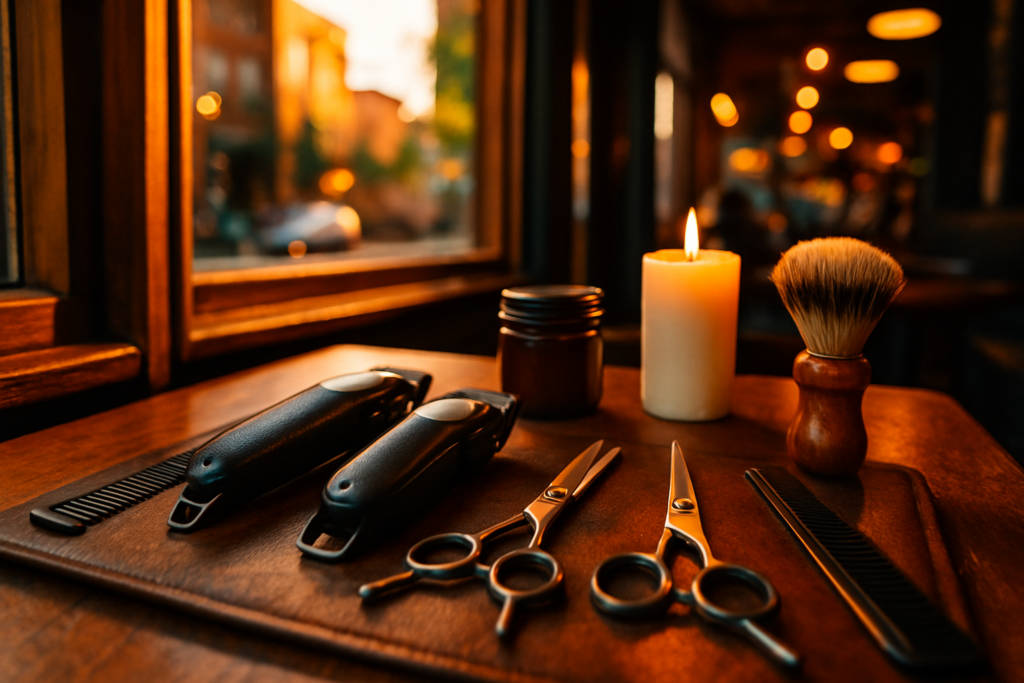Understanding Hair Types
Identifying the hair type is crucial for men aiming to choose the right products and routines. Hair types fall into four main categories: straight, wavy, curly, and coily.
- Straight Hair: Straight hair lacks curls and often appears shiny due to the oil’s ability to travel from the scalp to the tips without obstructions. This hair type can sometimes look flat and limp. Choosing lightweight shampoos and conditioners helps prevent excessive oil buildup.
- Wavy Hair: Wavy hair forms an ‘S’ shape, providing a natural volume and texture without prominent curls. It’s more prone to frizz than straight hair. Opt for sulfate-free products to maintain moisture without weighing down the waves.
- Curly Hair: Curly hair forms consistent loops and is more susceptible to dryness and tangles. Hydrate using conditioners rich in emollients and avoid products with harsh chemicals to retain the curls’ bounce and prevent frizz.
- Coily Hair: Coily hair, also known as kinky or afro-textured hair, features tight curls or zigzag patterns. This type is the driest and most fragile. Use deep-conditioning treatments and leave-in conditioners to keep coily hair hydrated and manageable.
Proper Washing Techniques
Optimizing washing techniques ensures the foundation for healthy, well-maintained hair.
Choosing the Right Shampoo and Conditioner
Selecting the appropriate shampoo and conditioner is crucial for achieving the best results. For straight hair, I look for lightweight formulas that provide volume without weighing down the strands.
Wavy hair benefits from moisturizing products that define natural waves, avoiding sulfate-based shampoos that cause frizz. Curly hair requires emollient-rich conditioners to retain moisture and manage curls. Coily hair thrives with deep-conditioning treatments to bolster hydration and elasticity.
How Often to Wash Your Hair
Washing frequency depends on hair type and lifestyle. Straight hair can handle daily washing if needed but every other day is optimal to avoid stripping natural oils.
I wash wavy hair every 2-3 days to maintain moisture balance and prevent frizz. Curly hair benefits from washing twice a week, as curls require more natural oils for definition and shine. Coily hair typically looks best with once-a-week washes to preserve natural oils and prevent dryness.
Styling Tips and Tricks
Men’s hair care extends beyond washing and conditioning. Styling holds equal importance in maintaining healthy hair and achieving desired looks.
Using Hair Products Wisely
Selecting appropriate hair products preserves hair health. For men with fine, straight hair, lightweight gels and mousses work best. Those with wavy hair benefit from texturizing sprays, which enhance natural waves.
Curly-haired men should opt for leave-in conditioners or creams to define curls sans frizz. Men’s hairstyles that need strong hold, such as pompadours, do well with pomades. When applying products, use a small amount and distribute evenly to avoid build-up and maintain natural textures.
Avoiding Heat Damage
Limiting heat exposure ensures hair remains healthy. Use hairdryers on low or medium settings to prevent drying out hair. For men who frequently use flat irons or curling tools, applying heat protectant sprays is crucial.
These sprays shield hair from high temperatures and reduce breakage. Air drying is the healthiest drying method, though it takes longer. If air drying isn’t viable, towel-dry hair gently by patting to remove excess moisture.
Hair Health from the Inside Out

Maintaining hair health involves more than just external care. What you put into your body impacts hair quality and growth significantly.
Importance of a Healthy Diet
A balanced diet rich in essential nutrients promotes hair health. Proteins, vitamins, and minerals play crucial roles:
- Protein: Hair is primarily made of keratin, a protein. Consume lean meats, fish, eggs, and legumes to support keratin production.
- Vitamins: B vitamins, especially biotin and B12, aid in cell renewal and hair growth. Include leafy greens, nuts, and whole grains in your diet.
- Minerals: Iron and zinc are vital for scalp health and hair strength. Red meat, spinach, and lentils offer these minerals.
A nutrient-rich diet contributes to healthier, stronger, and more vibrant hair.
Benefits of Hydration
Hydration impacts hair health by affecting the scalp and hair follicles. Proper hydration ensures that hair remains resilient and less prone to breakage. Keep these points in mind:
- Water Intake: Aim for at least 8 glasses of water daily to maintain overall hydration.
- Hydrating Foods: Water-rich foods like cucumbers, watermelon, and oranges supplement water intake.
- Scalp Moisture: An adequately hydrated scalp reduces dandruff and itchiness, promoting a healthier environment for hair growth.
Staying hydrated helps maintain the scalp’s natural moisture balance, enhancing hair texture and elasticity.
Common Hair Problems and Solutions
Many men encounter various hair issues, but practical solutions exist for each.
Dandruff and Dry Scalp
Flaking and itching usually stem from dandruff and dry scalp. To combat this, use an anti-dandruff shampoo containing zinc pyrithione or ketoconazole. Wash your hair regularly to prevent buildup. Hydrate your scalp with a conditioner designed for dry hair. Supplements like omega-3 fatty acids can also address scalp dryness. If symptoms persist, consult a dermatologist.
Hair Loss Prevention
Hair thinning and loss affect many men. Minimize these risks with a diet rich in vitamins like Biotin, Vitamin D, and Iron. Regular scalp massages boost circulation, promoting hair growth.
Avoid tight hairstyles that strain the hair follicles. Use a mild shampoo and avoid frequent washing to prevent weakening hair. Consider treatments like minoxidil for early intervention. For significant concerns, seek advice from a healthcare professional.



 Men’s Hair Care Specialist & Author
Araceline is a unique and valuable contributor, bringing her expert knowledge of men’s hair care and grooming trends. As an experienced author, she shares her deep understanding of hair painting, coloring techniques, and the specific needs of men’s hair. Araceline’s articles are both informative and engaging, offering men practical advice on maintaining stylish, healthy hair.
Men’s Hair Care Specialist & Author
Araceline is a unique and valuable contributor, bringing her expert knowledge of men’s hair care and grooming trends. As an experienced author, she shares her deep understanding of hair painting, coloring techniques, and the specific needs of men’s hair. Araceline’s articles are both informative and engaging, offering men practical advice on maintaining stylish, healthy hair.
